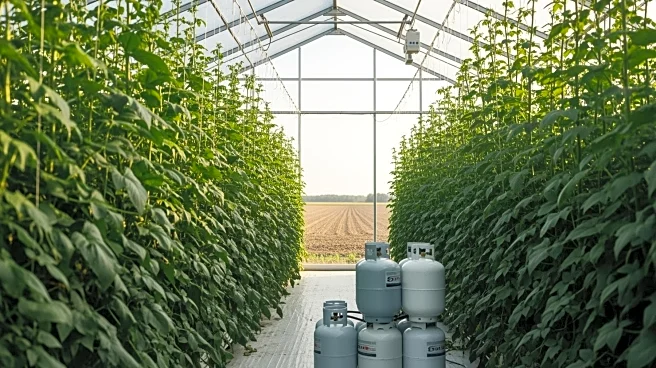What's Happening?
Wildhorse Propane & Appliance is emphasizing the role of propane in supporting greenhouse and vertical farming, particularly in California. Propane is highlighted as a key fuel for controlling growing environments efficiently, offering reliable temperature
control, cost-effective operations, and fewer greenhouse gas emissions compared to other fuels. The shift towards vertical farming, which uses significantly less water and land, is seen as a potential solution to challenges such as farmland loss and environmental changes. California, a leading agricultural producer, is losing agricultural land annually, prompting innovations like vertical farming to meet food demands. Wildhorse Propane has been serving agricultural communities since 1980, supporting local farms and agricultural innovations.
Why It's Important?
The integration of propane in vertical farming is crucial as it addresses the challenges posed by the loss of farmland and environmental changes. California's agricultural sector, vital to the U.S. economy, faces significant land conversion issues, with thousands of acres lost annually to urban development. Vertical farming, supported by propane, offers a sustainable alternative by maximizing yield with minimal land and water use. This approach not only supports local food economies but also contributes to national food security. Propane's role in providing stable and efficient energy solutions is pivotal in ensuring the viability of these innovative farming methods.
What's Next?
As vertical farming continues to gain traction, the role of propane in these systems is expected to expand. Stakeholders, including the Propane Education & Research Council, foresee propane as integral to the future of vertical farming. The successful turnaround of AeroFarms, a vertical farming pioneer, indicates growing confidence in these methods. Wildhorse Propane is committed to supporting local farms and agricultural innovations, potentially leading to increased adoption of propane-powered vertical farming solutions. This could result in enhanced food production capabilities and sustainability in California and beyond.
Beyond the Headlines
The shift towards vertical farming and the use of propane highlights broader implications for sustainable agriculture. This transition may influence cultural perceptions of farming, emphasizing technological integration and environmental stewardship. The reliance on propane also raises considerations about energy policy and the need for clean fuel alternatives. As small farms adapt to these changes, there may be shifts in local economies and community dynamics, fostering resilience against global economic influences and urban migration.
















